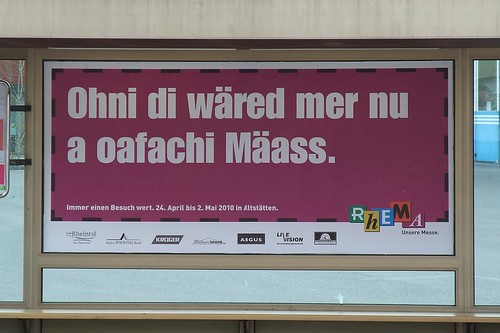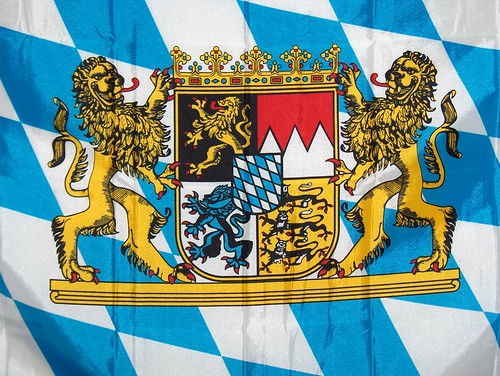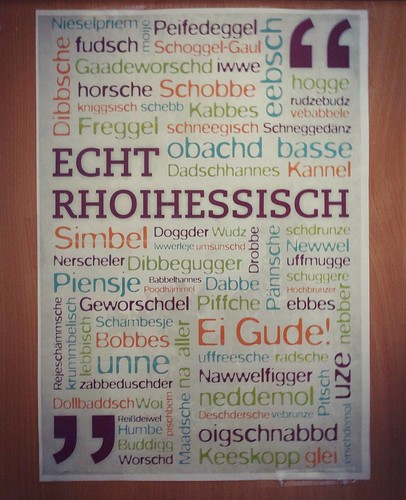Endangered German Dialects Posted by Constanze on Feb 28, 2017 in Culture, Language, Traditions
On 21st February the world celebrated International Mother Language Day – otherwise known as Tag der Muttersprache in German. On this day the hashtag #TagderMuttersprache was popular on Twitter, and when I clicked on it there were plenty of German articles about Bairisch – Bavarian!
Bavarians are famously proud of their language and culture. Even though the majority of them speak Hochdeutsch (high German), many Germans who grew up in Bavaria consider Bairisch their Muttersprache – usually because their mother spoke it while they were growing up. This is certainly the case for me, and I grew up in the UK! I grew up with my Bavarian mother speaking to me in Dialekt (dialect), and for a long time this was the only German I knew; I didn’t realise it was different to Hochdeutsch. I am by no means fluent in the dialect but I understand a lot of it, and I have an emotional connection to it that I think a lot of Bavarians can relate to.
Sadly, a lot of the articles I read talked about how Bairisch is essentially tot (dead) in the region’s capital, Munich! Whilst Bairisch is still spoken in rural parts of Bavaria, in urban Munich you are more likely to hear Hochdeutsch. This is a huge shame for Bavarians, many of whom classify Bairisch as a language – the language of Bavaria – rather than a German ‘dialect’.
Of course, as a language learner, you learn Hochdeutsch; dialects are specific to the region, and are learnt from birth. But they are a huge part of any country’s culture and history, and are often fascinating to language learners! So they are most definitely worth talking about, too – especially if there is a chance you won’t hear them at all anymore in years to come.
With the Bavarian language dying out amongst younger generations, there is danger of it dying out completely. UNESCO classifies Bairisch as a ‘vulnerable’ language – which is stage one of four (stage four meaning that the language has completely died out).
Steps need to be taken to keep the language going. A kindergarten in Munich called Kindergarten St. Franz Xaver has started Bairisch lessons for young children in an attempt to keep the language going for future generations. This is how my mother passed the language down to me (speaking it with me often, giving ‘classes’ at home, reading to me, watching Bavarian films together, etc. – and all from a very young age).
According to the UNESCO site, the Germanic languages/dialects in danger are as follows:
- Alemannic
- Bavarian
- East Franconian
- Limburgian-Ripuarian
- Low Saxon
- Moselle Franconian
- North Frisian
- Rhenish Franconian
- Romani
- Saterlandic
- Sorbian
- South Jutish
- Yiddish (Europe)
(Information from http://www.unesco.org/languages-atlas/index.php)
The purpose of International Mother Language Day (IMLD) is to promote the preservation and protection of all languages/dialects spoken worldwide – especially the endangered ones.
So with that in mind, I hope you enjoy this video I found on YouTube of a lady speaking lots of different German dialects!
12 different German dialects
Here’s a photo of a Swiss German dialect:

Caption reads: “That’s the St.Gall Rhine Valley slang and means: Without you we would be just a simple trade fair. In Deutsch: Ohne dich wären wir nur eine einfache Messe. Altstätten, Switzerland, Apr 19, 2010.” Photo by kecko on flickr.com under a CC license (CC by 2.0)
Here’s some Rheinhessisch dialect:
Here’s some dialect (on the top sign in the photo) from Sachsen (Saxony):
And, finally, here’s a message I recorded on Tag der Muttersprache! I am speaking the Bavarian dialect I grew up with.
A special message of love to you all in honour of #IMLD #TagDerMuttersprache 👅❤ I’m speaking the Bavarian dialect I grew up with. #Bairisch pic.twitter.com/SKB36xFCDa
— Constanze Mekkiou (@constanzearnold) February 21, 2017
Bavarian: “An diesem Dog da Muadasproch will i blos sogn – auf Bairisch – des I eich ganz liab hob”
Standard German: “An diesem Tag der Muttersprache will ich blos sagen – auf Bairisch – dass ich euch ganz lieb habe”
English: “On IMLD I just want to say – in Bavarian – that I love you all!”

Build vocabulary, practice pronunciation, and more with Transparent Language Online. Available anytime, anywhere, on any device.







Comments:
Alexis:
Does this blog have an Instagram?
Fahimeh:
Hello,
Today I found your blog and I found it very interesting. I live in Germany for about 3 years and I am learning german as well. The hardest part is the articles! I was woundering how native germans can rember the articles?!
Maja:
Hi there,
just for your information. Just because certain languages are listed on the territory of Germany on the UNESCO Atlas, doesn’t necessarily mean they are German dialects.
Romani has nothing to do with German. Neither does Sorbian, which is the smallest and most Western Slavic Language and closest to Slovak, Czech, Kashubian and Polish.
For Satarlandic and North-Frisian, they do belong to the Germanic language family, but they are independent languages, and no dialects.
Please do your research next time before you publish such articles and read a bit more about linguistic diversity in Europe. You will be surprised what else is out there. Thanks for your consideration and enjoy learning!
Thomas:
Slight correction: You probably mean something like “native languages in Germany”, not “Germanic languages/dialects”.
Romani, Sorbian are not Germanic.
helen:
Great. How about swiss dialect next time?
Mehrdad:
it’s cool and prima!
Jenny Lockwood:
Professor Anthony Rowley leads the study of the Bavarian language at Munich University. To hear another example, look at this video https://youtu.be/PZJxdmmkVD4. Prof Rowley has many publications on the subject – and the many subdivisions in the dialect. Take a look too at this Wiki article (written in ‘Ostmittelbairisch’): https://bar.wikipedia.org/wiki/Anthony_Rowley